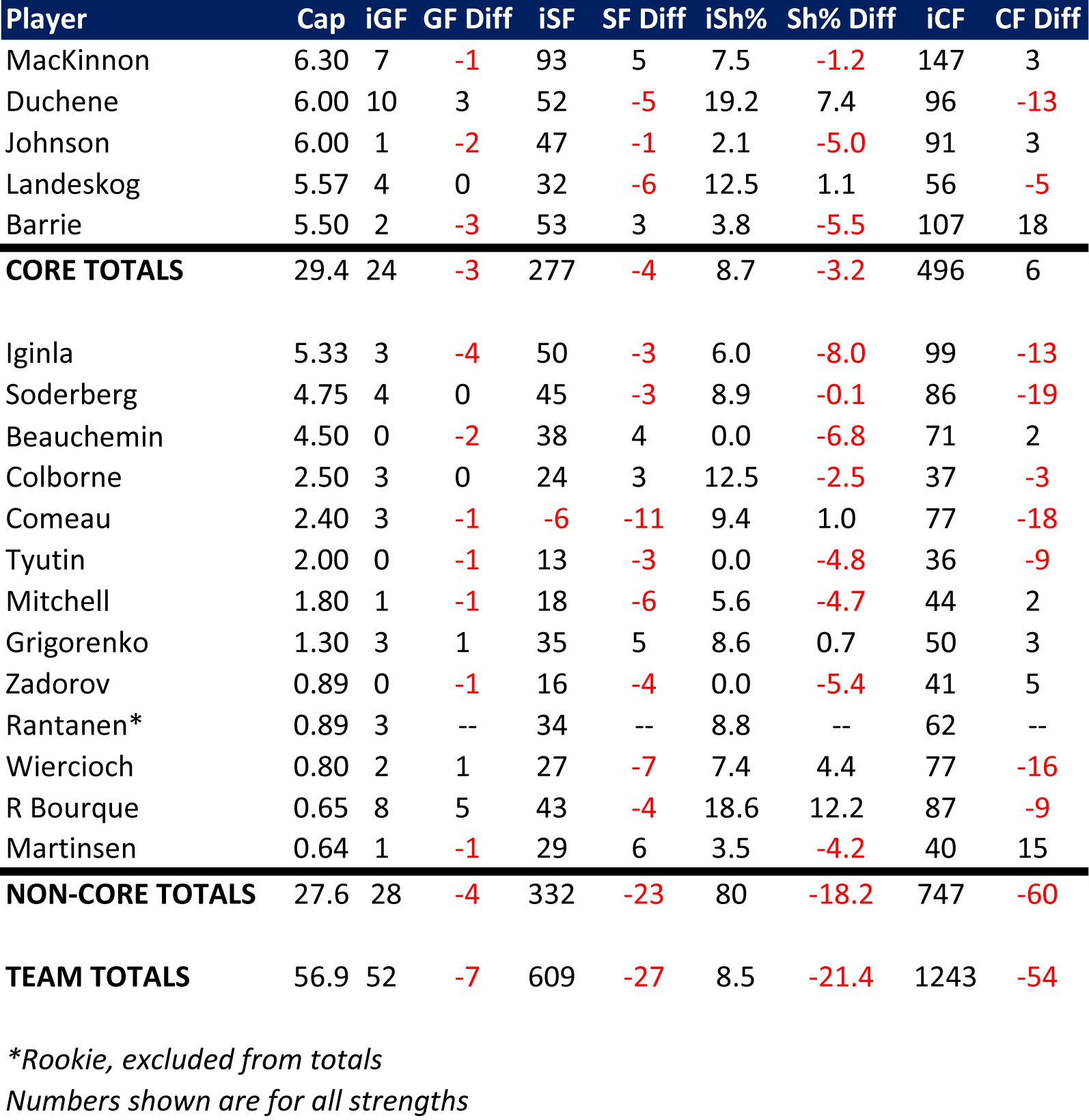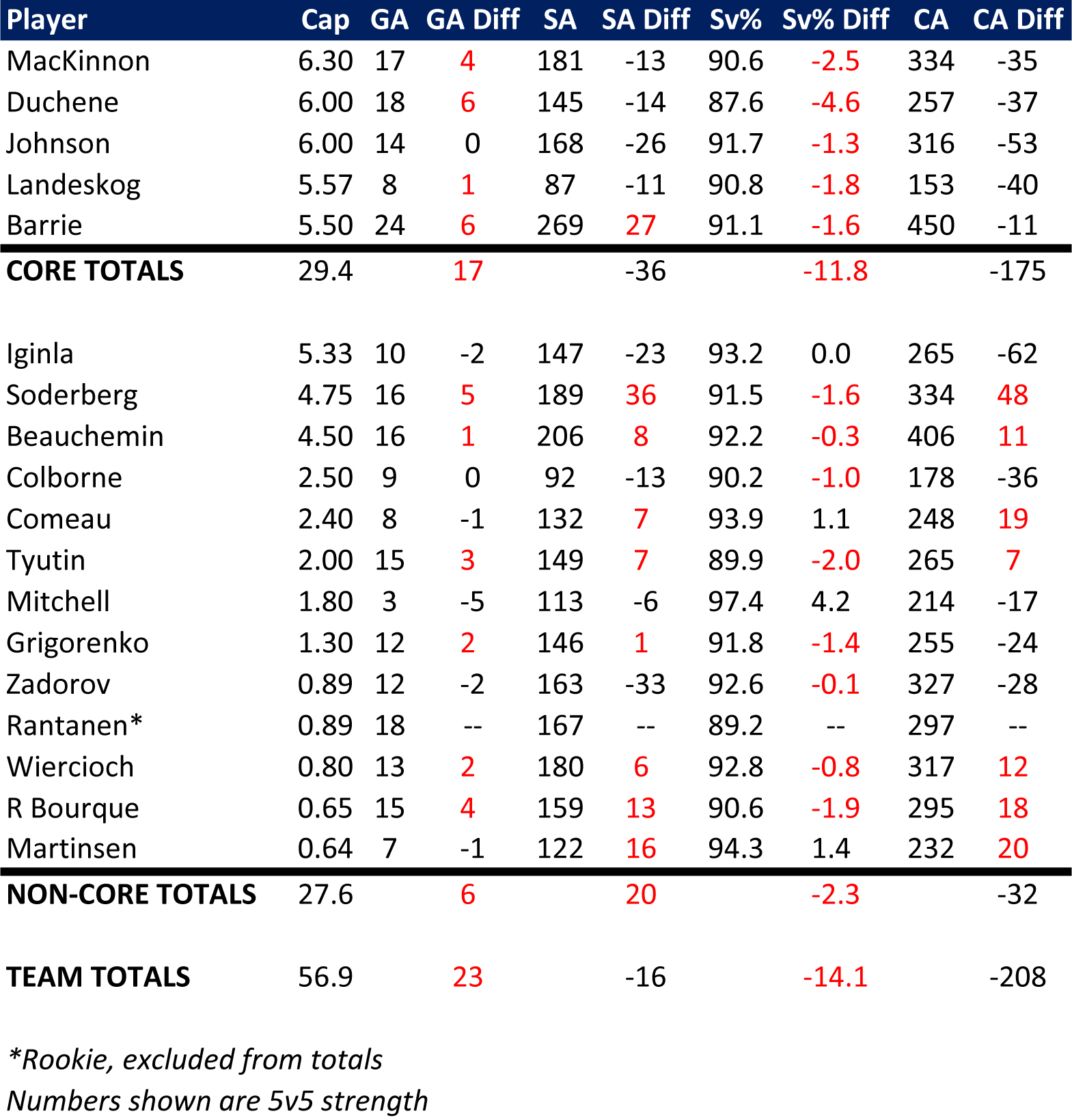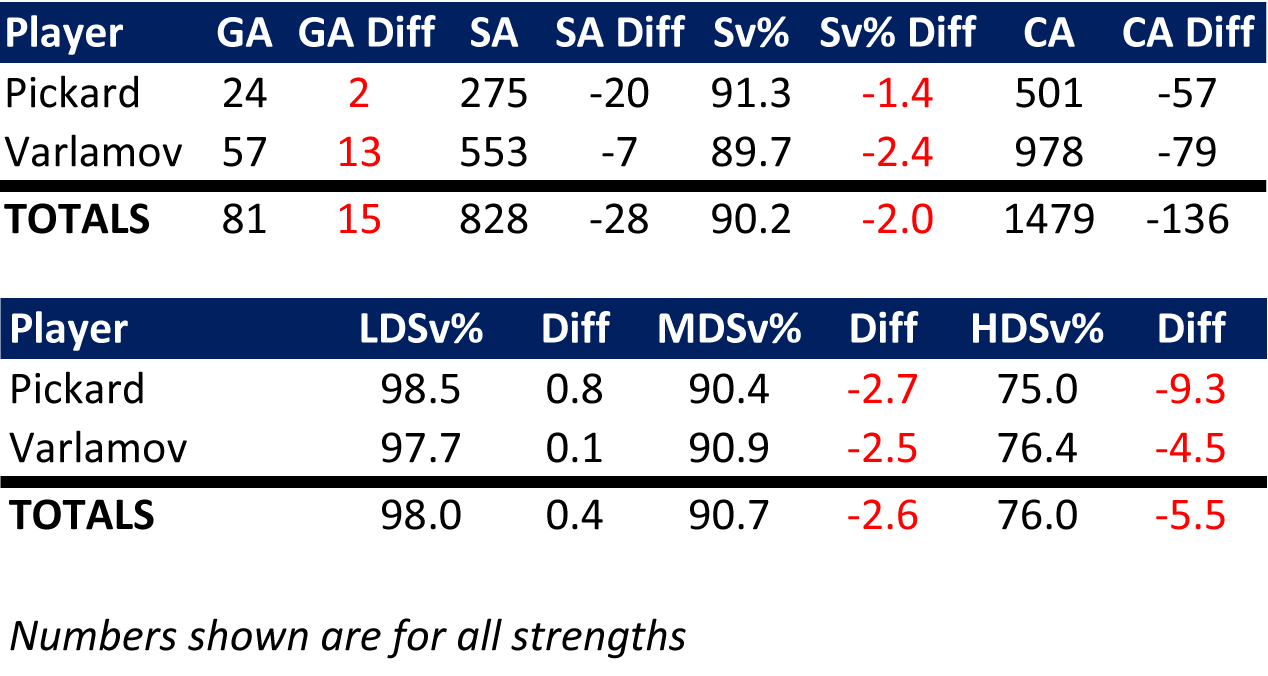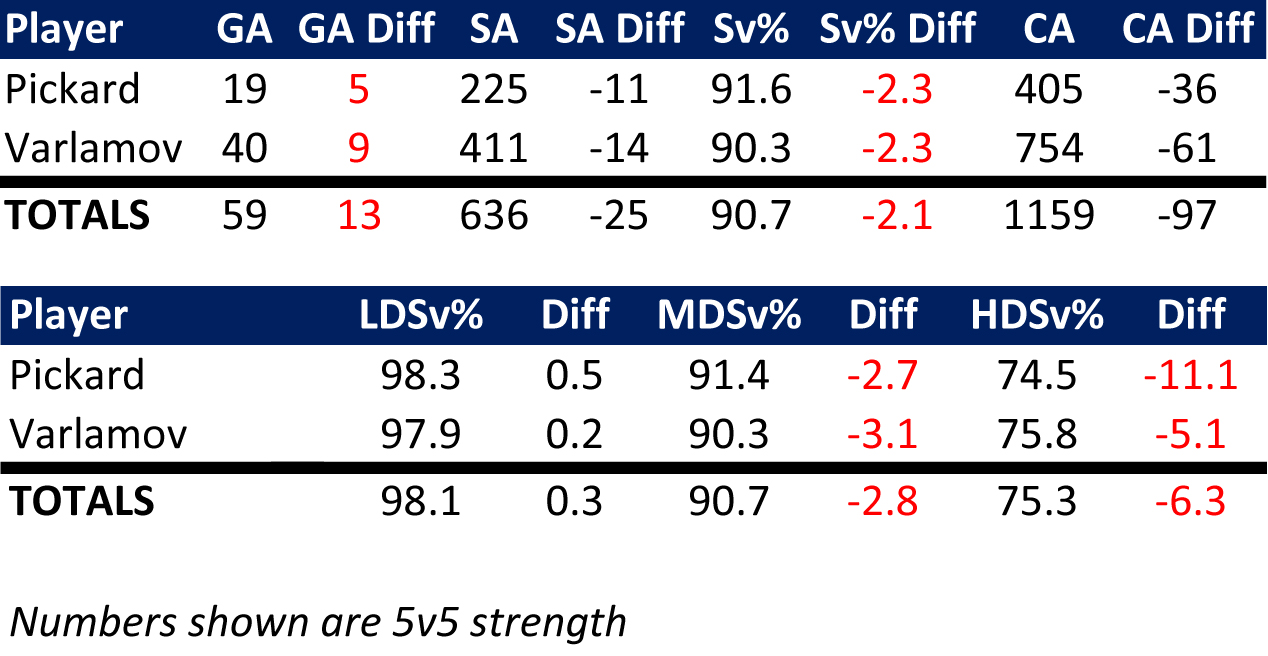© 2026 ALLCITY Network Inc.
All rights reserved.

During the Colorado Avalanche’s recent losing skid, there’s been a large amount of talk about the viability of the Avalanche’s core players – Nathan MacKinnon, Matt Duchene, Gabe Landeskog, Erik Johnson, Tyson Barrie, and Semyon Varlamov – moving forward.
After two seasons without playoffs, much of the blame has been laid at the feet of those six individuals, including from the departed former head coach, Patrick Roy. With another early golf season looming, they’ve come under intense scrutiny once more.
But are they to blame for the incredibly disappointing start to this season? Or are they serving as a scapegoat for something else instead?
To find out, I compared the core players to their teammates with over 200 minutes played so far this year. I then pulled the three-year average (’13-14 to ’15-16) for all 17 players and used their current season’s time on ice to calculate what their stats should look like at this point in the year.
First, let’s take a look at scoring.
Offense:

The Avs sit 29th in the NHL with 57 goals scored. (Ed’s note: This was written before the team’s game in Toronto. They now sit at 60 goals scored, tied for 28th with Arizona)** Unfortunately, this is not far from expected.
Even though almost all the players on the team are experiencing much lower shooting percentages than normal based on their three-year average, the club is short only 7 goals. While those goals may have served as the difference in key games, overall, they’d only bump the team to 27th in the NHL in scoring.
Barrie and Jarome Iginla have been the hardest hit, but their losses have been more than compensated by the standout performances of Rene Bourque and Matt Duchene. Even though Duchene refuses to score at the Pepsi Center, he’s still three goals above his expected pace. If it holds, he should finish the year north of 35 tallies. His current shooting percentage makes that unlikely, but chances are high he’ll at least hit the 30 goal plateau again this season.
Part of the team’s overall problem has been a severe decrease in shots. Although the core is fairly close to their normal pace, the non-core players are significantly below theirs. While many of those players played on at least one different team within the three-year window (which could strongly skew their expected pace), their numbers this season are still disconcertingly low.
The Avs, on the whole, are struggling to produce goals. It’s not that they’re getting unlucky; it’s just that they’re not traditionally a very talented group. While the core players are all likely to cross the 20 goal threshold, no one else but Rene Bourque and his ridiculously lucky 19% shooting is projected to even come close. That lack of depth scoring is an incredibly – and possibly insurmountably – large problem for the team.
While that could change as the year progresses, the Avs lack of scoring is less on the core players and more on the management. This group, barring extreme luck or massive stand-out years, was never going to be competitive in the NHL’s scoring race. While it would be nice to see a few more goals coming from the top players, it’s very difficult to blame them – and not General Manager Joe Sakic – for the bulk of the current woes.
** The five missing goals came from non-200 minute players and therefore aren’t represented in the above totals.
Defense:
The Avs defensively have been an interesting creature this year, especially when it comes to the core. Their shots allowed are down significantly (except for Barrie), and their Corsi events against have decreased an impressive amount. These underlying numbers indicate Bednar’s system is working: the players that see the ice the most are doing a much better job of preventing the other team from creating scoring opportunities.
However, their overlying numbers – goals allowed – are terrible. Duchene and Barrie have both already seen six more goals at 5-on-5 than they should have at this point on the year.
The culprit? Take a look at the save percentage column. Varlamov and Pickard have only stopped 87.6% of the shots they’ve seen when Duchene is on the ice. For reference, Duchene’s three year average is 92.2%. That nearly 5 point swing is huge, although every single member of the core has received sup-par goaltending. Only 4 of 12 non-core players have seen anything comparable as far as bad play from their netminders.
Also, many of the depth players have shots against and Corsi against rates far worse than their average. Carl Soderberg has been dreadful defensively this year both by his raw numbers and his distance from personal norms. Surprisingly, Iginla and Nikita Zadorov‘s numbers have improved significantly under Bednar, but if they’re removed from the list, the Avs depth becomes rather bleak defensively.
Goaltending:
As hinted at above, the Avs goaltending has been exceptionally poor this season. The tandem of Semyon Varlamov and Calvin Pickard have critically under-preformed, allowing an extra 15 goals than their 3 year pace suggests.
Take away those 15 tallies, and the Avs would rocket from 26th in the league in goals against to tied for 8th, and that’s before the decreased rate of shots and Corsi against from a better team-wide defensive effort is taken into account.
Pickard’s totals have made up some ground on the PK, but Varlamov has let in 4 more goals than expected shorthanded. Across all situations, the Avs goaltending save percentages are down, but they’ve fallen precipitously against high danger chances. This is despite the team doing a much better job of limiting chances against, including decreasing the opposition’s high danger shots by 6. It’s not much in the scheme of things, but it points to goaltending – not the defense – as what’s driving the save percentage numbers down.
If you’re curious just how poorly is preforming based on their averages and that of the league, Varlamov is the big red bar at the bottom of this graph:
Goalie Rankings via xGS : 2016-12-11 pic.twitter.com/VPfzPS3ttZ
— DTM About Heart (@DTMAboutHeart) December 11, 2016
Who’s To Blame:
So, is this season the core’s fault?
In the case of MacKinnon, Duchene, Landeskog and Johnson, the answer is no. While their offensive production might be down slightly, it’s certainly far from critical, and a moderately warm streak will quickly return it to norms. In today’s league, top six players are expected to produce 20+ goals, and barring injury, all three of the forwards should hit that mark with relative ease.
Defensively, all four have improved significantly. While their numbers still aren’t great in comparison to the league, given the quality of their teammates, they’ve preformed as admirably as can be expected in the face of long odds.
Even if they were to be traded, it’s unlikely the Avs would make a net gain statistically. Shipping them out would be the equivalent of shuffling deck chairs on the Titanic. While it might pacify fans for a time, there are much larger issues at play.
Unfortunately, in the case of Barrie and Varlamov, the criticism is warranted. Barrie’s never been outstanding defensively, but in the past few seasons, he’s established himself as an adequate top four option. This year, he’s allowed far more shots against and hasn’t improved his Corsi against at the same rate as the rest of the core. Perhaps he’s struggling to find chemistry with a new partner or adapt to Bednar’s more regimented system, but he’s turned the Avs second pairing into more of a liability than anticipated.
The puck-mover’s offense is usually enough to cover up his occasional defensive warts, but even that’s not worked well for Barrie. His shot and Corsi for totals have jumped slightly, but his shooting percentage is languishing. Luckily, this more the sign of bad luck than any sort of a step back, but it does amplify the pressure on his mistakes at the other end of the ice.
When it comes to Varlamov, no single other player is more to blame for the record than he. His numbers are frighteningly low, and Pickard’s totals aren’t much better. While it’s unlikely either netminder remains this far below career averages for the full season, they both have severely let down their teammates so far, especially given the much improved defensive effort the skaters have shown in front of them.
Whether it’s an adjustment to facing fewer shots or mental uncertainty over the looming expansion draft, the goaltending has been inexcusably putrid in Colorado all season. Any sort of a turn around will begin from the net out, and it’s ultimately up to these two individuals where the Avs will draft next June.
However, the true blame for this season is at the feet of Joe Sakic. While he’s shown improvement since the mistake-ridden 2014 offseason, this roster is not built to be competitive. On paper, it looks fine, but after digging into the underlying numbers, it becomes clear that there is very little offensive or defensive talent beyond the top players.
Whereas most teams in the NHL are capable of icing 7-9 forwards and 3-4 defensemen before a large drop off in talent, the Avs have 3-5 adequate forwards (MacKinnon, Duchene, Landeskog, Rantanen, and defensively Iginla) and around 2 decent defensemen (Johnson and Zadorov). Even if Soderberg and Barrie were having worthwhile years, the team would still need unexpectedly strong performances from players like Mikhail Grigorenko, Rene Bourque, and John Mitchell to even come close to average.
While the poor play of the goaltenders is certainly a major factor, in the end, the Avs are just not a very good hockey team. After eight years of failed development, the Avs are still in a rebuild. While prospects like AJ Greer, JT Compher, Tyson Jost, Chris Bigras, Duncan Siemens, and Spencer Martin provide rays of hope, Sakic has a ton of work ahead of him to clear out overpriced and inefficient depth. Only then will he be able to provide his core players with the support they need to pull the Avs from the league’s cellar.
Comments
Share your thoughts
Join the conversation






